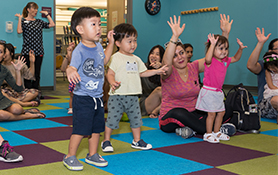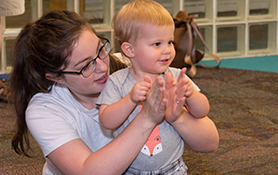Simple, short stories and movement activities help introduce the sounds and rhythms of language while developing age-appropriate motor skills. New themes and repeating elements each week encourage interaction, introduce words and their sounds and explore simple concepts. Typically 20-25 minutes.
Early learning programs run for 30 minutes and provide developmentally appropriate opportunities for parents and caregivers to interact with young children by playing, reading, talking, singing and writing to encourage literacy, school readiness and life-long learning.
Simple, short stories and movement activities help introduce the sounds and rhythms of language while developing age-appropriate motor skills. New themes and repeating elements each week encourage interaction, introduce words and their sounds and explore simple concepts. Typically 20-25 minutes.
Early learning programs run for 30 minutes and provide developmentally appropriate opportunities for parents and caregivers to interact with young children by playing, reading, talking, singing and writing to encourage literacy, school readiness and life-long learning.
Simple, short stories and movement activities help introduce the sounds and rhythms of language while developing age-appropriate motor skills. New themes and repeating elements each week encourage interaction, introduce words and their sounds and explore simple concepts. Typically 20-25 minutes.
Early learning programs run for 30 minutes and provide developmentally appropriate opportunities for parents and caregivers to interact with young children by playing, reading, talking, singing and writing to encourage literacy, school readiness and life-long learning.
Simple, short stories and movement activities help introduce the sounds and rhythms of language while developing age-appropriate motor skills. New themes and repeating elements each week encourage interaction, introduce words and their sounds and explore simple concepts. Typically 20-25 minutes.
Early learning programs run for 30 minutes and provide developmentally appropriate opportunities for parents and caregivers to interact with young children by playing, reading, talking, singing and writing to encourage literacy, school readiness and life-long learning.
Simple, short stories and movement activities help introduce the sounds and rhythms of language while developing age-appropriate motor skills. New themes and repeating elements each week encourage interaction, introduce words and their sounds and explore simple concepts. Typically 20-25 minutes.
Early learning programs run for 30 minutes and provide developmentally appropriate opportunities for parents and caregivers to interact with young children by playing, reading, talking, singing and writing to encourage literacy, school readiness and life-long learning.
Simple, short stories and movement activities help introduce the sounds and rhythms of language while developing age-appropriate motor skills. New themes and repeating elements each week encourage interaction, introduce words and their sounds and explore simple concepts. Typically 20-25 minutes.
Early learning programs run for 30 minutes and provide developmentally appropriate opportunities for parents and caregivers to interact with young children by playing, reading, talking, singing and writing to encourage literacy, school readiness and life-long learning.
Repetitive rhymes, songs and movement help introduce the sounds and rhythms of language, develop motor skills and give children a head start on learning. Enjoy simple books that explore familiar concepts, sounds and movements. Typically 20-25 minutes
Early learning programs run for 30 minutes and provide developmentally appropriate opportunities for parents and caregivers to interact with young children by playing, reading, talking, singing and writing to encourage literacy, school readiness and life-long learning.
Repetitive rhymes, songs and movement help introduce the sounds and rhythms of language, develop motor skills and give children a head start on learning. Enjoy simple books that explore familiar concepts, sounds and movements. Typically 20-25 minutes
Early learning programs run for 30 minutes and provide developmentally appropriate opportunities for parents and caregivers to interact with young children by playing, reading, talking, singing and writing to encourage literacy, school readiness and life-long learning.
Repetitive rhymes, songs and movement help introduce the sounds and rhythms of language, develop motor skills and give children a head start on learning. Enjoy simple books that explore familiar concepts, sounds and movements. Typically 20-25 minutes
Early learning programs run for 30 minutes and provide developmentally appropriate opportunities for parents and caregivers to interact with young children by playing, reading, talking, singing and writing to encourage literacy, school readiness and life-long learning.
Repetitive rhymes, songs and movement help introduce the sounds and rhythms of language, develop motor skills and give children a head start on learning. Enjoy simple books that explore familiar concepts, sounds and movements. Typically 20-25 minutes
Early learning programs run for 30 minutes and provide developmentally appropriate opportunities for parents and caregivers to interact with young children by playing, reading, talking, singing and writing to encourage literacy, school readiness and life-long learning.


